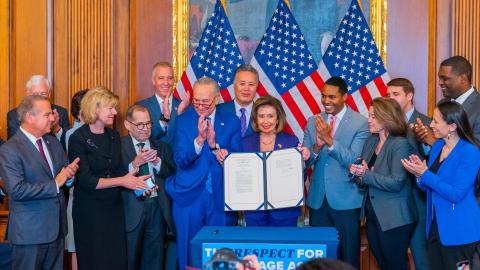EXCLUSIVE: State Dept. considers phasing out DP benefits
The Washington Blade has learned the State Department is considering phasing out domestic partner benefits for unmarried gay employees in the wake of the U.S. Supreme Court's 2013 ruling that struck down a portion of the Defense of Marriage Act.
Patrick Kennedy, under secretary for management at the State Department, told representatives of Gays and Lesbians in Foreign Affairs Agencies during a Dec. 22 meeting that the agency plans to move forward the proposed elimination of the Same-Sex Domestic Partner (SSDP) program.
GLIFAA President Selim Ariturk told the Washington Blade that many of his organization's members come from states that have yet to extend marriage rights to same-sex couples. He said their partners could also lose their jobs "simply for getting married to someone of the same gender."
Ariturk further noted that legally married foreign-born partners of GLIFAA members could face additional threats in their respective homelands.
"A diplomat from the embassy of an anti-gay country could walk into D.C. City Hall today and ask to see the marriage records of such a couple," Ariturk told the Blade. "Those records could then be used to ‘convict' the foreign partner of homosexuality the next time he travels home. The danger is real."
A gay entry-level Foreign Service officer who sought to remain anonymous told the Blade the State Department's domestic partner program "was the thing that really made" him "feel welcomed" in the agency.
"While it's great that we can get married much more easily now, my partner and I are not looking forward to being forced into a shotgun marriage due to a policy change that takes away the benefits we were promised," he said.
Then-Secretary of State Hillary Clinton in 2009 announced same-sex partners of Foreign Service personnel were eligible to receive a variety of benefits. These include diplomatic passports, access to medical facilities at overseas posts and coverage of "emergency travel" to visit ill or injured relatives or employees.
"Changing our policy to provide training, medical care and other benefits to same-sex domestic partners will promote the cohesiveness, safety and effectiveness of our posts abroad," said Clinton in a press release that announced the new policy. "This change is the right thing to do, and it is the smart thing to do."
The U.S. Supreme Court in June 2013 issued its landmark ruling that struck down a portion of DOMA.
GLIFAA subsequently recommended the State Department expand its domestic partner benefits program to opposite-sex couples. Matthew Asada of the American Foreign Service Association, a union that represents Foreign Service personnel, last September reiterated this call in a letter to Deputy Secretary of State for Management and Resources Heather Higginbottom.
"AFSA appreciates all that the department is doing to recruit and retain a professional, innovative and diverse diplomatic workforce," wrote Asada. "As the department considers how to proceed with its domestic partnership program, AFSA believes that the best course of action is not a phasing out of but rather an expansion of the program."
The Human Rights Campaign notes Walmart is among the 66 percent of Fortune 500 companies that now offer domestic partner benefits. More than half of these corporations have extended them to both gay and straight employees.
"The U.S. government-wide view is that special accommodations should be made when there are national impediments," wrote Higginbottom in an Oct. 23 letter to Asada. "This is not the case for opposite-sex partners."
A straight Foreign Service employee at the State Department who has been with her partner for seven years criticized the exclusion of heterosexual domestic partners from the current policy.
"While we are committed life partners who own a home together, marriage is not something we want forced on us just to have our relationship recognized," she told the Blade. "For us, and perhaps for many same-sex couples too, domestic partnership benefits would allow us to stay true to our values and also have our employer do the same. Many private employers do this. It is very unfair to me and others like me for the department not to expand domestic partner benefits to all couples."
Noel Clay, a spokesperson for the State Department, told the Blade on Tuesday the federal government is "in the process of making its policies comply with" the Windsor decision.
"For the State Department, one thing we have to do, which we've taken appropriate time to do correctly, is to review the SSDP program and determine how to make it comply with the Supreme Court's Windsor decision," he said.
Clay said the State Department is working with the Justice Department and other agencies on "next steps." He said the agency is also "listening to concerns and suggestions raised by" GLIFAA and the American Foreign Service Association.
"Any policy change will be well vetted before implementation," Clay told the Blade. "Any changes would include efforts to continue to protect LGBT employees and their families living in countries where it is difficult for LGBT people."
Ariturk told the Blade on Wednesday there is nothing within the Windsor decision "that requires any government authority or any employer to stop recognizing a civil union or a domestic partnership." He also stressed that Secretary of State John Kerry has "always been a progressive champion," noting he voted against DOMA in 1996 while in the U.S. Senate.
"The death threats facing GLIFAA partners from homophobic countries are even more scary, and some people just can't safely get a D.C. marriage certificate," said Ariturk. "We beg the department to maintain domestic partner protections for those who so desperately need them."
The State Department has not said when it will announce whether it will formally phase out the domestic partner benefits program.
